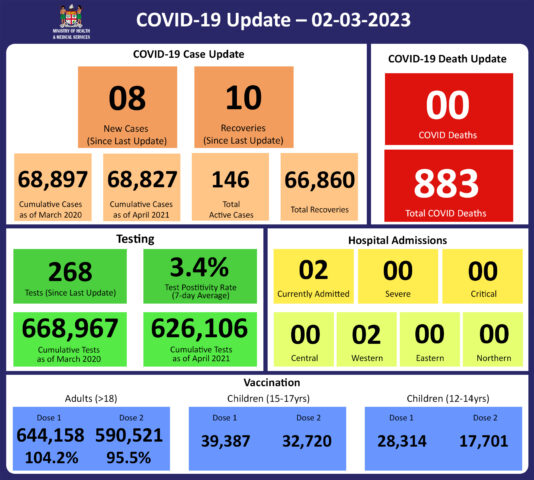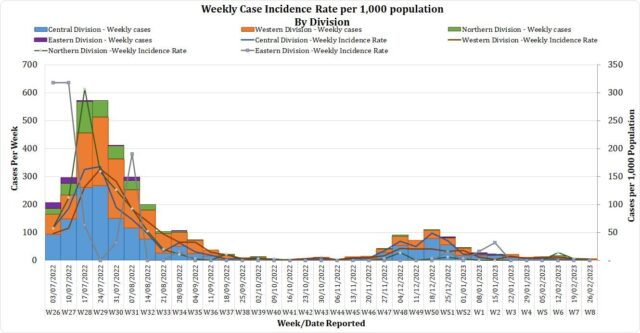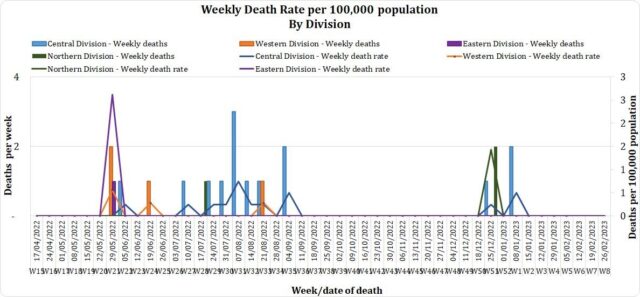COVID-19 Update 02-03-2023
COVID-19 Update
Thursday 02nd March
| Transmission Update:
Since the last update on 23/02/23, we have recorded 8 new cases. Of the 8 new cases recorded, 1 case was recorded in the Central Division; 7 cases in the Western Division; with nil cases in the Northern Division and Eastern Division. The national 7-day rolling average of cases as of 26th February is 2 daily cases. The Central Division cases constitute 66% of the cumulative total cases nationally, with the Western division making up 28%, 4% in the Northern Division, and 2% in the Eastern Division. |
||||||||||||||||||||||||||||||||||||||||||||||||||||||||||||||||||||
| Deaths:
The curve depicts weekly COVID-19 deaths by division since May 2021. It indicates a surge from last December, with peaks in mid-January 2022 followed by a downward trend. COVID Death Reports We have no (0) new COVID-19 deaths to report. Analysis of COVID-19 Deaths Table 1: Death rates by Division
An analysis of the 182 deaths recorded since December 2021, shows that the Central Division has the highest absolute number of deaths. The Northern Division has the highest rate of death when adjusted for population. Table 2: Deaths by Age Group
The death rate adjusted per 100,000 population, has been highest in the age group 50 years and over for the 182 deaths since December 2021. There were ten (10) deaths below the age of 19 years, 7 out of the 9 children had significant pre-existing medical conditions, and three (3) children had no known underlying medical condition. Table 3: Deaths by Vaccination Status
Of the 182 COVID-19 deaths reported since December 2021, eight (8) deaths were in the population not eligible for vaccination (under the age of 12). An analysis of the 174 deaths in the vaccine-eligible population revealed that Fiji has a death rate of 12.4 per 100,000 population for fully vaccinated adults and 344.4 per 100,000 population for unvaccinated adults. This means that unvaccinated adults in Fiji have been dying at a rate 27.8 times higher than fully vaccinated adults. Individuals in the 12-17 age group who died were not vaccinated. There has been a total of 883 deaths due to COVID-19 in Fiji. As of December 25th, 2022, the national 7 days rolling average for COVID-19 deaths per day is 0.0 with a case fatality rate of 1.28%. Due to the time required by clinical teams to investigate, classify and report deaths, a 4-day interval is given to calculate the 7 days rolling average of deaths, based on the date of death, to help ensure the data collected is complete before the average is reported. We have also recorded 1,006 COVID-19-positive patients who died from other serious medical conditions unrelated to COVID-19; their doctors have determined that COVID-19 did not contribute to their deaths, and therefore these are not classified as COVID-19 deaths. |
||||||||||||||||||||||||||||||||||||||||||||||||||||||||||||||||||||
| Hospitalisation:
Currently, we do not have any (0) admissions as a direct cause of COVID-19. However, two (2) admissions have tested as covid positive but are admitted for other diseases. Patients presented to the hospital are tested before admission therefore, a high number of people who are admitted for non-covid health conditions, test positive for COVID-19 due to the current level of transmission in the community. Using the WHO clinical severity classification, there are 100% (n=2) cases in the asymptomatic and mild categories; with nil cases in the moderate, severe and critical categories. |
||||||||||||||||||||||||||||||||||||||||||||||||||||||||||||||||||||
| Testing:
38 tests had been reported for 1st March 2023. The total cumulative tests since 2020 are 668,967 tests. And the 7-day daily test average is 38 tests per day or 0.0 tests per 1,000 population. The national 7-day average daily test positivity is 3.4% which is within the WHO recommendation of 5%. |
Public Advisory
Influenza and Acute Respiratory Illness
Our surveillance systems show that we continue to have a high level of influenza-like illness and acute respiratory illnesses since early December as part of the usual flu season. The influenza A virus has been isolated in sick cases. We have escalated Flu testing in selected sites and monitored hospital admission data to keep watch on trends.
LTDD
For Leptospirosis, there had been a general downward trend in the weekly incidence of lab-confirmed cases – case numbers were noted to be below the Average Thresholds for each of the 4 divisions and nationally. Cumulatively to date, the majority of lab-reported Lepto cases are from the Central Division (43%), followed then by the Western, Northern and Eastern Divisions. The majority of lab-reported cases are male (55%) or I-Taukei (73%). Most affected are persons in the 10-29 years old age group. However, we are expecting a rise in LTDD cases given the current weather conditions.
There has been a reported increasing trend in Typhoid cases, most of which were in the Western division with the majority lab reported cases being male (57%), or in the 10-39 years old age group. All lab-reported cases are i-Ttaukei.
There is a general upward trend in the incidence of lab-reported cases of Dengu however only the Northern Division incidence surpasses its Outbreak Threshold. The increase in Northern case numbers is driving the national trend to approach the national outbreak threshold. Majority of lab-reported cases are male (52%) or i-Taukei (54%), and most affected persons are in the 20-59 years old age group.
We continue to request the public to keep their surroundings clean and free from mosquito breeding sites. We are also requesting people wear appropriate footwear in muddy areas and areas with stagnant water. Our health inspectors have been diligently going out to inspect places of concern and actively applying punitive measures to property owners who have not been compliant in keeping their environment clean. Proper adherence to hand cleaning before meals and after using the washroom is strongly encouraged. We also encourage the public to be aware of the early indications of LTDD and ensure early presentation. Despite the high number of LTDD cases, we are grateful that severe disease cases have not been as high as before, primarily because more cases are being treated early.
For COVID-19;
There is a continuing report of COVID-19 cases however our case numbers are declining and likewise absenteeism rates from selected industries. However, we have registered (two) 02 patients who have incidentally tested positive for COVID-19 while admitted to the hospital. Correspondingly, we continue to focus on implementing COVID safe measures around those vulnerable to the severe effects of COVID-19. This includes escalating measures in hospitals, old people’s homes and facilities catering for disabled persons. As such we expect to escalate screening protocols and masking for staff, patients and visitors. Furthermore, visitor restrictions will be in place.
We currently enjoy a high level of protection from severe disease and as such we have supported the rescinding of all vaccine mandates. So far despite the surge in cases the impact on hospital admission has remained manageable. There is expected to be some immune escape capability that makes the variant more transmissible. The elderly, those with chronic diseases, pregnant mothers and children with disabilities need to be closely watched in this regard.
We emphasise the point that strengthening our ability to live with COVID means we remain vigilant, maintain community-wide adoption of COVID safe measures where appropriate, and keep the impetus for immunisation This is the only means to reduce the disease spread and protect those in the community who are less able to fend for themselves.
Also, anyone who falls sick should not be attending work or school, especially if they have COVID-19-like symptoms. You must get tested for COVID-19, and if tested positive, 7-day isolation is mandatory.
COVID-19 Vaccination
We have been reporting that 100% of our estimated adult population have received one dose and 95% have received the second dose. The vaccination of our target population has been progressing well with the 12 years and above coverage rate for Fiji being 99% for Dose 1 and 89% for Dose 2.
Furthermore, as of the 01st of March, 171,073 (54.7%) booster-eligible individuals have so far received their 3rd dose while 29,290 individuals have been administered the 4th dose.
Increasing Vaccine Booster Coverage Program
The following COVID-19 vaccination services are currently offered at the sites:
- 1st and 2nd dose of COVID-19 vaccines for 12 years and above
- 1st and 2nd dose of COVID-19 boosters for 18 years and above
An individual is eligible for the first booster dose 3 months after receiving the 2nd dose of the COVID-19 vaccine and the 2nd booster dose 4 months after receiving the 1st booster dose.
The public is advised that the COVID-19 vaccination programme for children aged 5-11 years old is currently unavailable and the Ministry will advise once the programme resumes.
To register online for the first dose, please visit vra.digitalfiji.gov.fj
The public is reminded that vaccination sites strictly close at 3 pm. Therefore, any person going to the site in the afternoon is requested to be present at least by 1.30 pm.
Sites for vaccination will be operational from 9 am – 3 pm each day (Monday – Friday) while Suva Health Center will also operate on Saturdays (9 am – 3 pm).
The list of sites is available at: bit.ly/35Fozux
Last Updated on 1 year by Publishing Team



